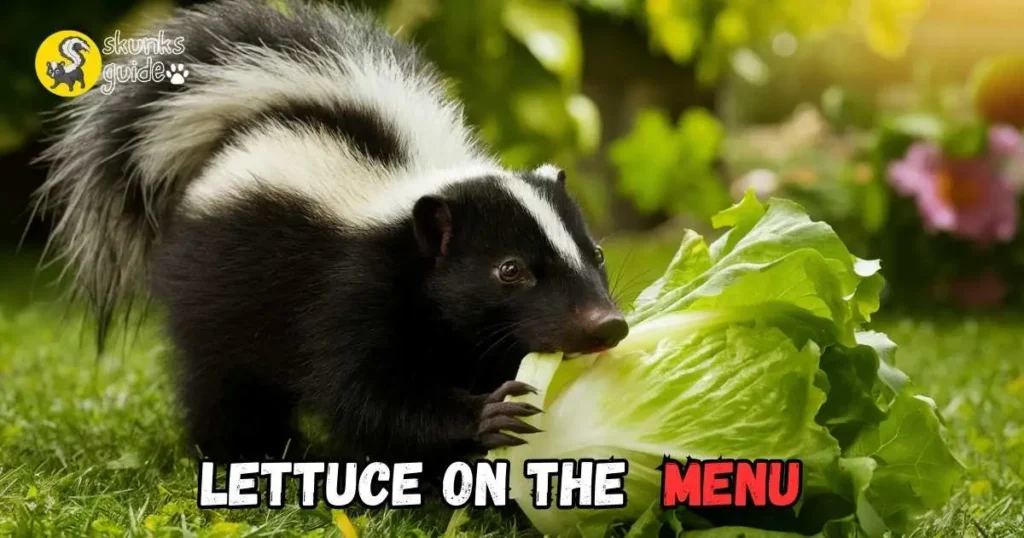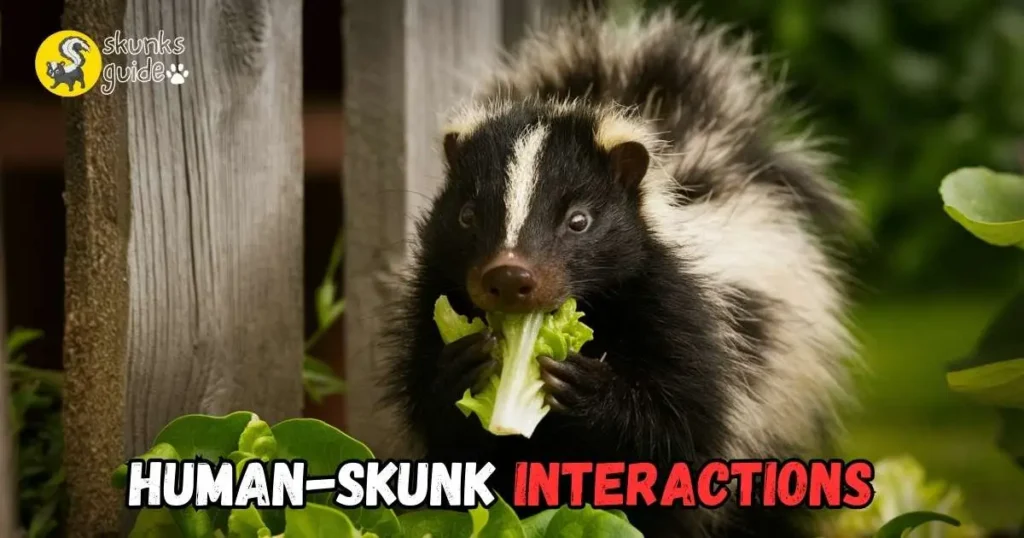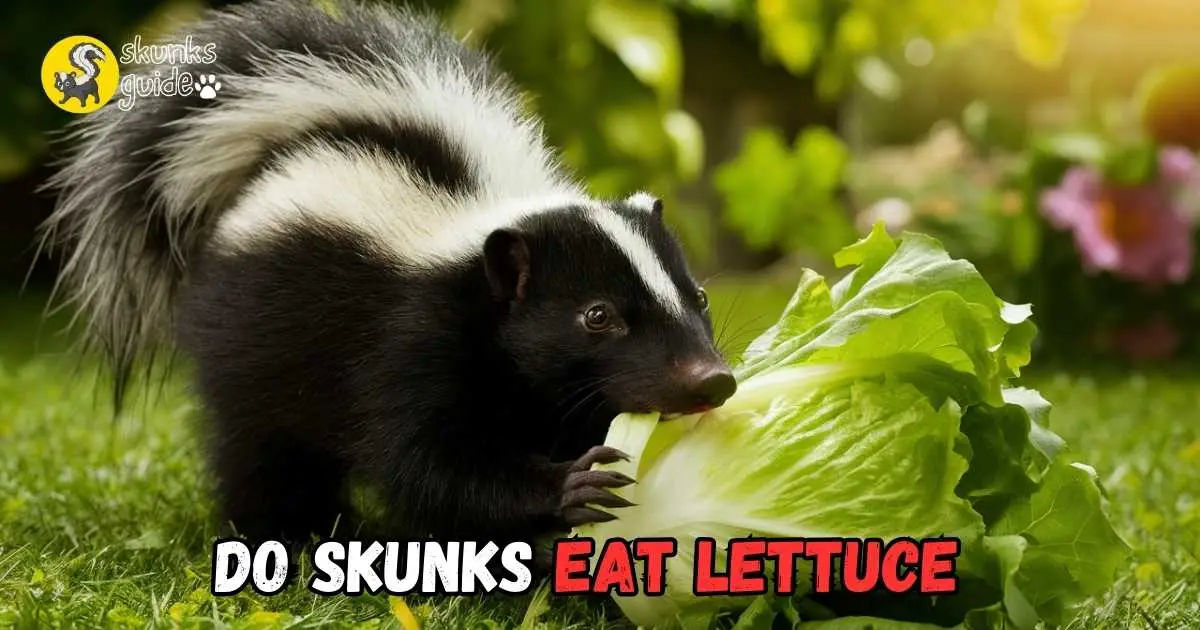Do Skunks Eat Lettuce
Last updated on September 27th, 2024 at 05:37 am
Yes, skunks do eat lettuce, though it isn’t their top choice. As opportunistic omnivores, they’ll nibble on lettuce if they come across it in a garden. While not a preferred meal, lettuce provides hydration and is easily accessible, especially in human gardens. From my studies in skunk behavior, I’ve found that while lettuce is safe, it doesn’t give them much energy. In this article, you’ll find out why skunks may nibble on lettuce but prefer heartier meals. Stick around to understand how their eating habits help them survive in the wild!
Skunks In The Backyard: Diet Overview
Imagine finding a skunk scurrying in your backyard. These black and white creatures are known for more than their pungent spray. Understanding what skunks eat can help us live alongside them. Do they munch on leafy greens like lettuce? Let’s dive into their eating habits.
Natural Foraging Habits
Skunks are nocturnal foragers. They rummage at night searching for food. With their sharp claws, skunks dig into the soil. They hunt bugs, worms, and grubs. Each night, their quest for food may bring them into your garden.
- Bugs and insects
- Worms and grubs
- Small rodents
- Fallen fruit
Dietary Versatility Of Skunks
Skunks have a varied diet. They eat both plants and small animals. Season changes also affect their meals. Skunks adapt and eat what they find.
| Season | Skunk Diet |
|---|---|
| Spring | Insects, grubs |
| Summer | Fruits, crops, rodents |
| Fall | Nuts, berries, plants |
| Winter | Remaining food sources, store fat |
Skunks may eat lettuce if it’s available. They look for foods rich in nutrients. Lettuce in gardens can attract them. They will snack on what they find edible.
- Eat plants, animals
- Adapt to seasons
- May include garden veggies
Skunks in backyards require understanding for coexistence. Recognizing their dietary habits forms part of this understanding.
Lettuce On The Menu
Curious about what skunks munch on in the wild? They have a taste for various plants, with lettuce becoming a surprising entry on their menu. Let’s dig into what skunks eat when it comes to leafy greens!

Common Vegetation In Skunk Diets
Skunks are omnivores, meaning they enjoy both plants and meat. Vegetation often features in their diet, including:
- Fruits like berries and fallen apples
- Roots and tubers when they dig
- Leaves of various plants
These foods provide essential nutrients for the skunk’s health. They forage for plants at night, as skunks are nocturnal creatures.
Lettuce As A Potential Food Source
Lettuce can indeed be a part of a skunk’s diet. If they come across it, they’re likely to give it a try. Here’s why lettuce can appeal to these creatures:
- It’s soft and easy to eat
- Lettuce holds water, which helps with hydration
Lettuce isn’t a skunk’s main food choice, but they will not turn it down if available.
Gardeners, beware: skunks might visit your lettuce patch!
Garden Raiders: Do Skunks Target Lettuce?
When dusk falls, your garden becomes a dining room for nocturnal visitors.
The question arises: do skunks eat lettuce?
Skunks, known for their distinct smell, also possess a diverse palate.
They often sneak into gardens. They look for food like insects, small rodents, and yes, even garden produce.
This brings us to the hearty greens of lettuce.
A crunchy, leafy vegetable, lettuce is not just a human favorite.
It also attracts various forms of wildlife, including skunks.
Evidence Of Skunks Eating Garden Produce
Signs of skunk presence in gardens include:
- Shallow holes were dug in search of insects.
- Nibbled fruits and vegetables, skunk-like zucchini.
- Faint tracks lead to uprooted plants.
Skunks are omnivores. This means they enjoy both plant and animal-based foods.
Your lettuce can become a target for these black and white creatures.
Protecting Lettuce From Wildlife
To secure your lettuce from skunks and other critters, consider these steps:
- Install a fence that extends underground to deter diggers like skunks.
- Place mesh covers over garden beds at night.
- Remove food sources that attract skunks, such as fallen fruits or pet food.
Strategize your planting. Pairing lettuce with plants that repel skunks may help protect your greens.
Examples include squash and marigolds.
Employing motion-activated lights or sprinklers can also scare off potential garden raiders.
Human-skunk Interactions: Garden Intrusion Impacts
Skunks are infamous for their defensive spray. Yet, they often wander into backyards. Skunks search for food and may stumble upon leafy greens, including lettuce. This can lead to unexpected garden encounters. Homeowners might not know how much a skunk can disrupt a garden’s balance. Let’s explore how to manage these natural occurrences.

Minimizing Skunk Visits
Make your garden less appealing to these critters. Seal up trash cans and limit access to compost piles. Fence off your garden, especially the base, as skunks are not strong climbers.
Motion-activated lights or sprinklers can startle skunks away. Also, consider planting deterrent plants like marigolds, which some skunks dislike. These tips help protect your lettuce and other plants.
Coexisting With Skunks In Suburban Areas
Skunks can be a part of suburban life. Understanding and adapting are key. Do not corner or threaten skunks, as this increases the risk of getting sprayed.
If skunks are regular guests, assess your garden layout. Create a designated area away from main garden spots where skunks can forage without causing harm.
- Maintain a clean yard free of food scraps and accessible delicacies.
- Install a low-level fence as a boundary, buried a few inches underground.
- Remember, skunks control insect and rodent populations, providing an ecological benefit.
Wildlife Experts Weigh In Skunks’ Dietary Habits
Nature’s gardeners, and skunks, have a menu that surprises many of us. Wildlife experts decided to explore what skunks eat. Their findings provide insight into not just skunk diets, but also how to keep them out of your lettuce patch!
Studies On Skunk Foraging
Research sheds light on the foraging patterns of these nocturnal creatures. Skunks are opportunistic eaters with a diverse diet. Here’s what studies have unearthed:
- Insects and Grubs
- Small Rodents
- Fruits and Berries
- Lettuce and Other Garden Veggies
Lettuce is indeed on the menu. Skunks prize its easy access and high water content. A study from the University of Garden Delights showed skunks visiting vegetable gardens frequently, especially during dry spells.
Expert Advice On Deterring Skunks
Skunk-proofing your garden calls for strategic thinking. Here are expert tips to safeguard your lettuce:
- Secure Compost Bins: Keep them tightly closed.
- Proper Fencing: Skunks are poor climbers, so a solid fence works well.
- Natural Repellents: Ingredients like citrus peels or peppermint oil.
Lights and Noise: Occasionally, changing light patterns or a radio can ward off curious skunks. Wildlife professionals emphasize humane deterrents for effective control without harm.
Protecting Your Greens: Strategies To Deter Skunks
Protecting Your Greens: Strategies to Deter Skunks can be a tricky task. These curious creatures often find their way into gardens. They might eat lettuce and other vegetables. Gardeners must be crafty to protect their crops.
Fencing And Barrier Solutions
Skunks are skilled diggers. To keep them out, barriers must go underground. Here are effective fencing strategies:
- Install a Fence: Bury it at least 1.5 feet deep.
- L-shaped footers: Prevent skunks from digging underneath.
- Electric Fencing: Small, safe shocks discourage entry.
Ensure gates also have barriers at the base.
Natural Repellents And Deterrence Techniques
Nature provides solutions to repel skunks. Below are non-harmful techniques:
- Citrus Peels: Scatter them around your garden. Skunks dislike the smell.
- Motion-Activated Sprinklers: Startle skunks with a burst of water.
- Spicy Peppers: Mix chopped peppers and water. Spray around the greens.
Refresh repellents regularly for the best effect.
Frequently Asked Questions
Yes, skunks can safely eat romaine lettuce. It’s a nutritious addition to their varied diet but always offer it in moderation.
Skunks should not consume chocolate, caffeinated beverages, alcohol, onions, garlic, or salty and sugary foods. Avoid feeding them pet food with artificial preservatives.
Yes, skunks can eat garden vegetables. They are omnivores and may dig in gardens for food, including veggies.
Conclusion
To wrap up, skunks do indeed show interest in lettuce, viewing it as an occasional snack. This surprising dietary choice highlights their omnivorous nature. Gardeners take note: Protect your lettuce patches to avoid skunk visits. Embracing their diverse palate can lead to peaceful coexistence with these creatures.

